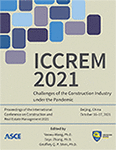Profit Distribution of the IPD Project on Triangular Fuzzy Number Payoff Cooperative Game
Publication: ICCREM 2021
ABSTRACT
Integrated Project Delivery (IPD) has emerged as a novel project delivery system to achieving project goals and improves traditional project delivery methods. The success of the IPD mode is inseparable from the corresponding profits distribution mechanism. The focus of this study is to establish a method to optimize profit distribution in the IPD project. It used the membership function of the triangular fuzzy number (TFN) for the payoff function for profit distribution in the IPD mode. The Shapley values in the fuzzy cooperative game were expressed by the TFNs based on the concept of the α-cut sets, which is the interval of the Shapley value. Because of the Shapley value expressed by fuzzy value, the profit distribution value of IPD project is further given, which has better application value and practical significance. Finally, a case study that evaluates the proposed approach is presented to illustrate the use of the model and to demonstrate the capability of the model.
Get full access to this article
View all available purchase options and get full access to this chapter.
REFERENCES
AIA & AIA California Council. (2010). “Integrated project delivery: case studies.” McGraw Hill Construction, (1), 1–62.
Azhar, N., Kang, Y., and Ahmad, I. U. (2014). “Factors influencing integrated project delivery in publicly owned construction projects: an information modelling perspective.” Procedia Engineering, 77, 213–221.
Borkotokey, S., Hazarika, P., and Mesiar, R. (2015) “A multilinear extension of a class of fuzzy bi-cooperative games.” Journal of Intelligent and Fuzzy Systems, 28(2), 681–691.
Branconi, C. V., and Loch, C. H. (2004). “Contracting for major projects: eight business levers for top management.” International Journal of Project Management, 22(2), 119–130.
Dubois, D., and Prade, H. (1980). Fuzzy sets and systems theory and applications, Academic Press, New York.
El Asmar, M., Hanna, A. S., and Loh, W. Y. (2013). “Quantifying performance for the integrated project delivery system as compared to established delivery systems.” Journal of Construction Engineering and Management, 139(11), 04013012.
Han, T., and Li, D. F. (2016) “Shapley value method of profit allocation for cooperative enterprises with intuitionistic fuzzy coalitions.” Journal of Systems Science and Mathematical Sciences, 36, 719–727.
Kent, D., and Becerik-Gerber, B. (2010). “Understanding construction industry experience and attitudes toward Integrated Project Delivery.” J. Constr. Eng. Manage, 136, 815.
Li, D. F. (2012). “A fast approach to compute fuzzy values of matrix games with payoffs of triangular fuzzy numbers.” European Journal of Operational Research, 223(2), 421–429.
Meade, L. M., and Lilesa, D. H. (1997). “Justifying strategic alliances and partnering: a prerequisite for virtual enterprising.” Omega, 25(1), 29–42.
Jia, N. X., and Yokoyama, R. (2003) “Profit allocation of independent power producers based on cooperative game theory.” Electrical Power and Energy Systems, 25(8), 633–641.4.
Shapley, L. S. (1953). “A value for n-persons games.” Annals of Mathematics Studies, 28(7), 307–318.
Tan, S., Ye, C. Y., Ren, R. X., and Ling, S. (2013). “The model based on modified Shapley in partnering mode of profit distribution.” 2013 Conference on Education Technology and Management Science (ICETMS 2013), Nanjing, China, 426–428.
The American Institute of Architects (AIA), California Council. (2014). Integrated project delivery: an updated working definition, Sacramento, CA.
Teng, Y., Li, X., Wu, P., and Wang, X. Y. (2017). “Using cooperative game theory to determine profit distribution in IPD projects.” International Journal of Construction Management, 19(1), 1–14.
Zhao, W. J., and Liu, J. C. (2018). “Interval-valued fuzzy cooperative games based on the least square excess and its application to the profit allocation of the road freight coalition.” Symmetry, 10(12), 1–11.
Zhao, B. F., and Zhang, Y. J. (2013). “Algorithm of Shapley value for cooperative games with dual fuzzy factors.” Computer Engineering and Applications, 49(19), 25–30.
Information & Authors
Information
Published In
Copyright
© 2021 American Society of Civil Engineers.
History
Published online: Dec 9, 2021
Authors
Metrics & Citations
Metrics
Citations
Download citation
If you have the appropriate software installed, you can download article citation data to the citation manager of your choice. Simply select your manager software from the list below and click Download.
